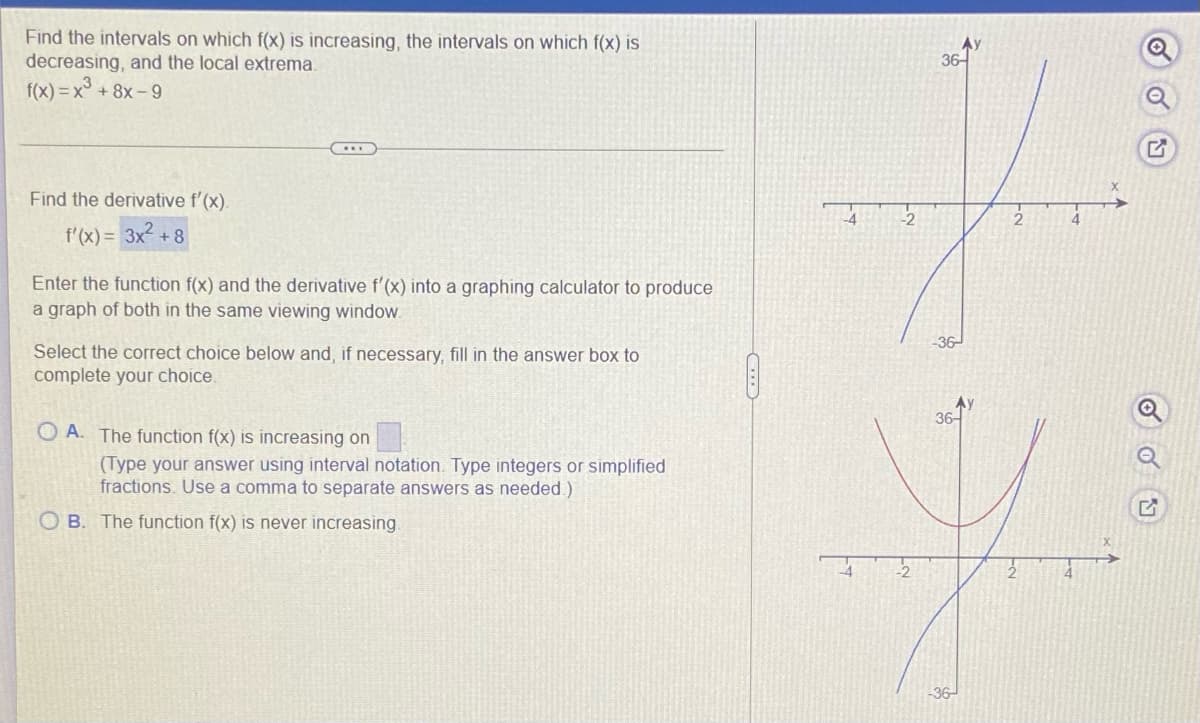Find the intervals on which f(x) is increasing, the intervals on which f(x) is decreasing, and the local extrema. f(x) = x° + 8x-9 36- Find the derivative f'(x). 2 f'(x) = 3x2 +8 Enter the function f(x) and the derivative f'(x) into a graphing calculator to produce a graph of both in the same viewing window. -36 Select the correct choice below and, if necessary, fill in the answer box to complete your choice. 36- O A. The function f(x) is increasing on (Type your answer using interval notation Type integers or simplified fractions. Use a comma to separate answers as needed.) O B. The function f(x) is never increasing
Find the intervals on which f(x) is increasing, the intervals on which f(x) is decreasing, and the local extrema. f(x) = x° + 8x-9 36- Find the derivative f'(x). 2 f'(x) = 3x2 +8 Enter the function f(x) and the derivative f'(x) into a graphing calculator to produce a graph of both in the same viewing window. -36 Select the correct choice below and, if necessary, fill in the answer box to complete your choice. 36- O A. The function f(x) is increasing on (Type your answer using interval notation Type integers or simplified fractions. Use a comma to separate answers as needed.) O B. The function f(x) is never increasing
Calculus: Early Transcendentals
8th Edition
ISBN:9781285741550
Author:James Stewart
Publisher:James Stewart
Chapter1: Functions And Models
Section: Chapter Questions
Problem 1RCC: (a) What is a function? What are its domain and range? (b) What is the graph of a function? (c) How...
Related questions
Question
18

Transcribed Image Text:Find the intervals on which f(x) is increasing, the intervals on which f(x) is
decreasing, and the local extrema.
f(x) = x° +8x-9
Ay
36-
Find the derivative f'(x).
4
f'(x) = 3x + 8
Enter the function f(x) and the derivative f'(x) into a graphing calculator to produce
a graph of both in the same viewing window.
-36-
Select the correct choice below and, if necessary, fill in the answer box to
complete your choice.
36-
O A. The function f(x) is increasing on
(Type your answer using interval notation Type integers or simplified
fractions. Use a comma to separate answers as needed.)
O B. The function f(x) is never increasing.
-36-
Expert Solution
This question has been solved!
Explore an expertly crafted, step-by-step solution for a thorough understanding of key concepts.
This is a popular solution!
Trending now
This is a popular solution!
Step by step
Solved in 2 steps

Recommended textbooks for you

Calculus: Early Transcendentals
Calculus
ISBN:
9781285741550
Author:
James Stewart
Publisher:
Cengage Learning

Thomas' Calculus (14th Edition)
Calculus
ISBN:
9780134438986
Author:
Joel R. Hass, Christopher E. Heil, Maurice D. Weir
Publisher:
PEARSON

Calculus: Early Transcendentals (3rd Edition)
Calculus
ISBN:
9780134763644
Author:
William L. Briggs, Lyle Cochran, Bernard Gillett, Eric Schulz
Publisher:
PEARSON

Calculus: Early Transcendentals
Calculus
ISBN:
9781285741550
Author:
James Stewart
Publisher:
Cengage Learning

Thomas' Calculus (14th Edition)
Calculus
ISBN:
9780134438986
Author:
Joel R. Hass, Christopher E. Heil, Maurice D. Weir
Publisher:
PEARSON

Calculus: Early Transcendentals (3rd Edition)
Calculus
ISBN:
9780134763644
Author:
William L. Briggs, Lyle Cochran, Bernard Gillett, Eric Schulz
Publisher:
PEARSON

Calculus: Early Transcendentals
Calculus
ISBN:
9781319050740
Author:
Jon Rogawski, Colin Adams, Robert Franzosa
Publisher:
W. H. Freeman


Calculus: Early Transcendental Functions
Calculus
ISBN:
9781337552516
Author:
Ron Larson, Bruce H. Edwards
Publisher:
Cengage Learning